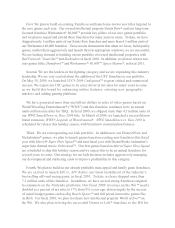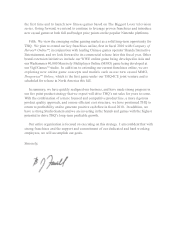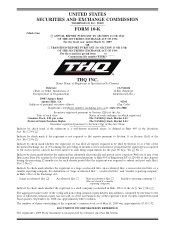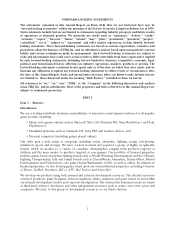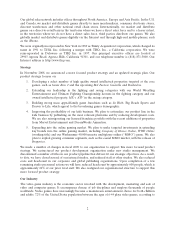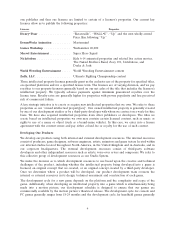THQ 2009 Annual Report Download - page 12
Download and view the complete annual report
Please find page 12 of the 2009 THQ annual report below. You can navigate through the pages in the report by either clicking on the pages listed below, or by using the keyword search tool below to find specific information within the annual report.ranges from 9-18 months. These development cycles require that we assess whether there will be adequate
retailer and consumer demand for a game and its platform well in advance of its release.
The investments in our development, prior to reaching technological feasibility, are recorded as product
development expenses in our consolidated statement of operations as well as non-capitalizable costs such
as quality assurance. We had product development expenses of $109.2 million in fiscal 2009, $128.9 million
in fiscal 2008 and $97.1 million in fiscal 2007.
Upon completion of development, each game is extensively play-tested by us to ensure compatibility with
the appropriate hardware systems and configurations, and to minimize the number of bugs and other
defects found in the products. If required, we also send the game to the manufacturer for its review and
approval. To support our products after release, we provide online access to our customers on a 24 hour
basis as well as operator help lines during regular business hours. The customer support group tracks
customer inquiries, and we use this data to help improve the development and production processes.
Manufacturing Our Products
Other than games we release for sale on PCs, digital download, or wireless devices, our video games are
manufactured for us by the platform manufacturers or their authorized vendors. We contract with various
DVD replicators for the manufacturing of our PC products.
The platform game manufacturing process begins with our placing a purchase order with a manufacturer.
We then send the approved software code to the manufacturer (together with related artwork, user
instructions, warranty information, brochures and packaging designs) for manufacturing.
We are required by our platform licenses to provide a standard defective product warranty on all of the
products sold. Generally, we are responsible for resolving, at our own expense, any warranty or repair
claims. We have not experienced any material warranty claims, but there is no guarantee that we will not
experience such claims in the future.
Distributing Our Products—Marketing and Sales
The manner in which we drive consumer demand for our brands across the globe has evolved significantly
in recent years as we have expanded our owned and licensed franchise portfolio. At the global brand
management level, we take a disciplined approach to defining and refining positioning for our key game
releases. We implement extensive consumer and retail research including concept and play testing in
conjunction with our development studios.
Our marketing plans vary by target demographic but generally consist of a three-pronged media plan
encompassing TV, print and online advertising. Certain of our campaigns also include billboard
advertising, event sponsorship, in-theater advertising and radio placements. Retail or Channel Marketing
efforts for our games include pre-sell give-aways, displays and/ or demonstrations at retailer-specific trade
shows, and cooperative retail advertising campaigns.
We are taking a more aggressive approach in what we term the ‘‘connected marketing’’ space. This
includes how we build our brand in the online space via editorial opportunities; screen shot, trailer and
other game content releases online; advertising; official game websites; and community outreach and
management. Game trial has been a key driver of consumer demand for several of our core games,
through consumer demos released at retail or online, or game demos available at kiosks stationed at sports
or other entertainment events.
Publicity is another key driver of awareness for our game portfolio, as well as for THQ, as a publicly-held
company. We maintain strong relationships with a broad group of business, consumer, entertainment and
games enthusiast reporters across the globe, working closely to secure positive editorial coverage across
broadcast, print and online editorial outlets.
5




